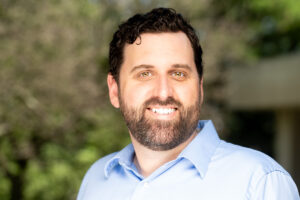Prof. Matt Larsen’s research shows charter schools create more competition
By Bryan Hay
After Hurricane Katrina leveled many of New Orleans’ public schools, the city was forced to reposition its schools with the city’s population base.
Even before the 2005 hurricane, many of the schools were already in poor structural shape and could not withstand Katrina’s floodwaters. In rebuilding its education system, by 2019 New Orleans had adopted an almost all-charter school model, meaning autonomous governance at each facility and presenting a situation where students and their families could apply to attend any school in the city, not just those in their neighborhoods as they had under the traditional system.

Prof. Matt Larsen
As part of his postdoctoral work at Tulane University, Matt Larsen, associate professor of economics, joined with Douglas Harris, professor of economics at Tulane, to examine the effects of competition among the New Orleans charter schools in an educational system without traditional assigned schools.
Their published findings show that families prefer charter schools offering more extracurricular activities, such as sports and music programs, and after-school child care, all resulting in competition among the independent schools.
“There’s a big movement now to have more school choice. And economists are especially interested in that because it creates more competition, which we generally think is a good thing,” Larsen says. “The idea of school choices is let’s have other schools that you can attend if you don’t think your assigned school is good enough or the right fit for your child. A lot of places around the country have charter schools, including here in the Lehigh Valley.
“What we looked at here are how families are prioritizing their choices,” he says. “Academics are a huge part of that, but they do care about many other things, which maybe isn’t surprising.”
Larsen’s research reveals that lower income families place a lower priority on academics and make their choices based on programs such as after-school care. “The most well-off families can just choose based purely on academics essentially,” he notes. “Whereas the least well off have to sacrifice some of that for other things.”
Students in Larsen’s senior capstone course, Economics of Education, are benefiting from the research, learning about economic effects of the New Orleans charter school model and how it contrasts with traditional school districts, which are essentially monopolies that don’t have to compete for students.
“As people choose where to live, where they live determines where they go to school. So that affects housing prices,” he says. “Students or families are going to choose schools that are better performing, and that’s going to pull them away from bad schools, incentivizing them to do better or possibly fail. This competition may be good in terms of raising the quality of all the schools, but also could widen inequality.”
Read more about Larsen’s work in an article recently published in Education Next, a journal of opinion and research about education policy.

